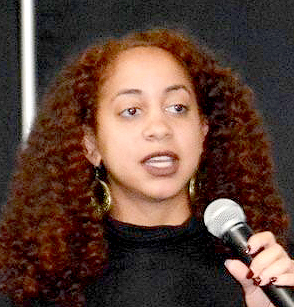KFTC leaders commit to Organizational Change Initiative
As KFTC quickly approaches our 40th anniversary next summer, there’s much to consider celebrating.
The organization – with origins in tax reform and a deep history and brand of Appalachian environmentalists – has grown to become the commonwealth’s premier group of grassroots social justice lobbyists and voting rights advocates. Across the country, KFTC is held in high esteem among our peers.
We certainly have grown quite a bit, to the degree that we need a temperature check and a recalibration.
On May 28, Executive Director Burt Lauderdale, Chairperson Cassia Herron and Organizational Development Consultant Pamela Chiang made a presentation to the Steering Committee laying out the case to orient and organize ourselves toward an Organizational Change Initiative (OCI). The Steering Committee approved the proposal.
“Our membership has changed, our program of work has exploded, and Kentucky has changed. It’s time for us to examine our goals, assess our role in advancing social justice, and reshape the strategies and structures we use to pursue our vision.”
– Cassia Herron
“People are protesting the police murders of unarmed Black men and women, not only in Louisville, but in small towns across the state. Something’s rising in Kentucky and the nation, and the Organizational Change Initiative will help KFTC to meet this historic moment,” said Meta Mendel-Reyes, KFTC’s immediate past chair and Executive Committee member.
“As a statewide, grassroots organization, KFTC is well-positioned to play a critical role, but only if we organize ourselves to meet the moment. That's where OCI comes in.”
The Steering Committee has discussed the need for a comprehensive strategic planning process for more than two years, but postponed the project in favor of more urgent work including our integrated voter engagement as well as other organizational development priorities such as the racial justice assessment carried out in 2019-20.
It’s been almost 20 years since our last comprehensive strategic planning process. In that time, KFTC has evolved and grown.
Why “Organizational Change?”
While we plan to step back and look at the whole picture of KFTC, some key elements of organizational change are prominent in the discussion.
Chief among these is the deepening understanding of and commitment to racial justice as a core component of our theory and practice of change.
Throughout much of 2019 and early 2020, KFTC went through a racial justice assessment. One of the primary recommendations from the assessment was for KFTC to pursue “structural reimagining” to create a structure that could be more diverse, equitable and inclusive.
That objective sits at the forefront of the OCI.
Another component of organizational change in process is our staff team.
Last fall the majority of our non-management staff petitioned KFTC to be represented by the Chicago and Midwest Regional Joint Board, Workers United. Four days later the Steering Committee recognized the union and the process of negotiating a contract began in March. It has been slowed by COVID, but continues with video conferencing. We expect a contract will be finalized in the next few months and will help shape how the staff team is integrated into our overall structure.
A third area of organizational redesign and change work opened up with the announcement to the Steering Committee last fall from long-time KFTC Executive Director Burt Lauderdale that he will transition off the KFTC staff in August of 2021.
When announcing his decision last November, Lauderdale told the Steering Committee, “There’s a lot of reasons why this is the right time for this step for KFTC – and mostly it’s just time. As we take on the task of transforming KFTC – again – it’s the right time to imagine a staff team and staff function with a different form of, and person in, staff leadership.”
Reimagining the executive staff leadership and bringing new personnel into the role will be an important component of a redesigned staff team and organization.
There are many more elements of the OCI including affirming and updating our transformational vision for Kentucky and defining what’s the best role for KFTC in pursuit of that vision. We expect to examine the focus of our core strategies and their relationship to each other: how we organize and how we can enhance our strategies.
Finally, as Chiang noted, we expect to put in place new policies, practices and processes that keep the organization fresh and relevant, focused and able to realize the internal and external change we imagine in this process.
“Our country, communities and commonwealth are facing an overwhelming set of crises and opportunities for transformative change. As a leading progressive organization in Kentucky and key player in the broader social justice movement, KFTC has the obligation and commitment to continually reflect and reimagine ourselves,” said Lisa Abbott, a long-time staff member and organizer.
“This organizational change initiative is our next time to inquire, listen, reflect and make choices that will shape the next 20 years in Kentucky. How will we equip ourselves and our organization to fight for a healthy, multi-racial democracy, address structural racism and climate change, and win big structural changes needed for a Just Transition to a healthy and just economy?”
That’s the work before us.
Meet KFTC’s Support Squad
Our Organizational Change Initiative will require much from us individually and as a unit. We will need support from each other and our friends. Meet the folks who have stepped in thus far.
 |
Pamela Chiang has been a consultant with KFTC for more than 10 years, working as an executive coach to Burt Lauderdale and facilitator for staff development. She specializes in organizational change. |
 |
Tony Bennae Richard is an Organizational Development and Change Practitioner, Trainer, Educator. He has considerable experience working with executive level nonprofits and unions in their organizational change and improvement efforts. |
 |
Aja Barber is a public health professional and has worked with KFTC as a mediator and trainer. She has a passion for facilitating the understanding that we can build something different by transforming our structures and institutions in ways that work for all of us. |
Recent News
Kentucky’s past legislative session showed alarming trend toward government secrecy
Churchill Downs takes more than it gives. That's why the Kentucky Derby is a no-go for me
‘We must never forget.’ Kentucky town installs markers for lynching victims.
Featured Posts
Protecting the Earth
TJC Rolling Out The Vote Tour – a KFTC Reflection Essay
KFTC Voter Empowerment Contractor Reflection Essay
Archives
- Home
- |
- Sitemap
- |
- Get Involved
- |
- Privacy Policy
- |
- Press
- |
- About
- |
- Bill Tracker
- |
- Contact
- |
- Links
- |
- RSS

